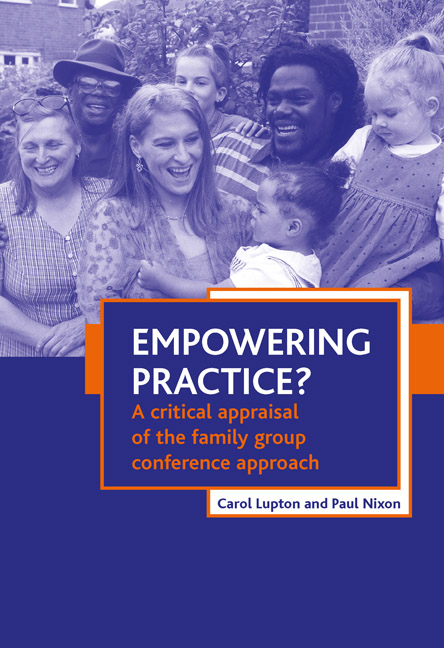Book contents
- Frontmatter
- Contents
- Preface
- Acknowledgements
- Introduction
- one The dilemmas of empowerment
- two Partnership and empowerment in children’s services
- three Lessons from New Zealand
- four Empowering professionals?
- five International perspectives
- six Empowerment in process?
- seven Assessing outcomes in child welfare
- eight Empowering outcomes?
- nine Conclusion
- Bibliography
- Index
eight - Empowering outcomes?
Published online by Cambridge University Press: 05 July 2022
- Frontmatter
- Contents
- Preface
- Acknowledgements
- Introduction
- one The dilemmas of empowerment
- two Partnership and empowerment in children’s services
- three Lessons from New Zealand
- four Empowering professionals?
- five International perspectives
- six Empowerment in process?
- seven Assessing outcomes in child welfare
- eight Empowering outcomes?
- nine Conclusion
- Bibliography
- Index
Summary
Introduction
Chapter Six has established that the FGC process generally appears very enabling of family participation and represents, potentially at least, a means for greater partnership between the family members and the professionals. Effective participation in the process of decision making, however, is only one of the preconditions of user empowerment. No matter how potentially enabling the process, and accepting that this may itself be viewed as an “immediate output” (Hudson et al, 1996, p 15), the FGC will not serve to empower family members if the plans they make are not ultimately successful. While the experience of being involved may be empowering in itself, the quality or longevity of that empowerment will be impaired if those involved perceive that little has changed as a result and/or that their decisions have been undermined or ignored. Worse, such an experience may actively ‘disempower’ participants, reinforcing their perception of the limited extent of their control over events. Failure to protect a child or enhance his/her welfare may not only be profoundly disempowering for that child (or worse) but also for those who may feel that they have failed (possibly again) in their role as parents. Fear of plan failure was one of the main concerns expressed by the family members interviewed in one of the pilot studies (Lupton et al, 1995).
This chapter examines the available UK evidence on the outcomes of FGCs, again in the context of the key issues raised by the international literature. It begins by setting out the central objectives of the FGC approach using the framework devised by Hudson et al (1996) of a progression from ‘immediate outputs’ to ‘ultimate outcomes’. The extent to which and ways in which these objectives can be seen to have been achieved is then examined and attempt is made to answer the central question of whether they, individually or in combination, appear to provide for the empowerment of those involved. Throughout the discussion, the nature of the existing research evidence on outcomes is described and the areas where additional research is needed are highlighted.
Evaluating outcomes
As we have argued in the previous chapter, the identification and evaluation of ‘outcomes’ in social life is notoriously difficult, not least in terms of establishing causality in the face of human agency.
- Type
- Chapter
- Information
- Empowering Practice?A Critical Appraisal of the Family Group Conference Approach, pp. 155 - 178Publisher: Bristol University PressPrint publication year: 1999



